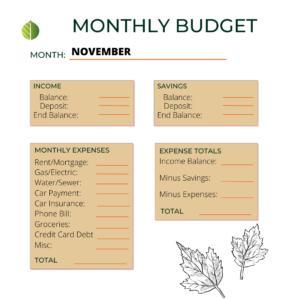Posted on November 2, 2022

- 1. Track where your money goes for a month
- 2. Identify areas where you can cut back, even by a little bit
- 3. Automate your finances so that you save without even thinking about it
- 4. Make a plan – figure out what you want your money to do for you and how to make that happen
- 5. Negotiate with creditors to lower interest rates or monthly payments
- 6. Seek help if needed – there are plenty of people who are more than happy to give budgeting advice
- 7. Stay motivated and don’t give up!
- You Can Do It!
Are you failing to make your budget work? You’re not alone. A lot of people have trouble sticking to a budget, but it’s important to try to fix the problem. Here are a few tips on how to get your budget under control and start saving money.
1. Track where your money goes for a month
If you’re like most people, you probably have a pretty good idea of where your money goes each month. You know how much you spend on rent or your mortgage, and you’ve got a pretty good handle on your other regular expenses like groceries, utilities, and transportation.
But what about all those other little purchases that can add up over time? If you’re not tracking your spending, it can be easy to lose track of where your money is going.
For example, you may find that you’re spending more on dining out than you realized, or that you could save money by buying in bulk at the grocery store. Tracking your spending can also help you spot any potential problem areas, such as excessive credit card debt or a string of unplanned purchases.
If you’re not sure how to get started, there are plenty of resources available to help you. There are various apps and software programs that can help you track your spending, or you can simply use a pencil and paper.
- Mint
- Goodbudget
- You Need A Budget (YNAB)
Whichever method you choose, make sure to be diligent about recording every purchase, large and small. At the end of the month, review your findings and see where you may be able to cut back. With a little effort, tracking your spending can help you get a better handle on your finances.
2. Identify areas where you can cut back, even by a little bit
We all have areas in our lives where we can cut back, even by a little bit. Maybe we can save on our monthly grocery bill by cutting out one unnecessary item. Maybe we can save on our car insurance by driving a little less each month.
Whatever the case may be, every little bit counts! By taking a close look at our spending and identifying areas where we can cut back, we can free up more money to save or invest. And over time, those small cuts can add up to big savings! So take a close look at your budget and see where you can cut back, even by a little bit. It could make a big difference in your financial picture.
3. Automate your finances so that you save without even thinking about it
Saving money can seem like a daunting task, but it doesn’t have to be. Automating your finances is a great way to ensure that you’re putting money aside each month without even thinking about it.
There are a few different ways to do this.
- You can set up a direct deposit from your paycheck into a savings account
- You can automate transfers from your checking account to your savings account each month.
- You can also set up automatic payments for your bills so that you’re never late on a payment and incur any late fees.
By automating your finances, you’ll be able to save money without even thinking about it – and before you know it, you’ll have a nice nest egg built up.
4. Make a plan – figure out what you want your money to do for you and how to make that happen
Most people know that it’s important to save for the future, but it can be difficult to figure out where to start. One helpful way to get started is to make a plan. Figure out what you want your money to do for you and how to make that happen.
For example, do you want to retire early? Save for a child’s education? Build up an emergency fund? Once you know your goals, you can start working on a plan to achieve them. Start by looking at your income and expenses and see where you can cut back or save more.
You may also want to consider investing in a 401k or other retirement accounts. With a little planning, you can ensure that your money is doing exactly what you want it to do.
5. Negotiate with creditors to lower interest rates or monthly payments
If you’re struggling to keep up with your monthly bills, it may be time to negotiate with your creditors. You can start by
- Calling your creditors and asking to speak to a supervisor.
- Then, explain your financial situation and ask if they’re willing to lower your interest rate or monthly payments.
- If they’re not open to negotiation, you may want to consider working with a credit counseling service. This organization will work with your creditors on your behalf to try to lower your interest rates and monthly payments.
While there’s no guarantee that this will be successful, it’s worth trying if you’re struggling to keep up with your current payments.
6. Seek help if needed – there are plenty of people who are more than happy to give budgeting advice
Anyone who has ever tried to stick to a budget knows how difficult it can be. There are so many temptations and unexpected expenses that can quickly throw your carefully crafted plan off course. If you find yourself struggling to stick to a budget, don’t be afraid to seek help.
There are plenty of people who are more than happy to give budgeting advice, including financial advisors, money management apps, and even friends and family members. The important thing is to reach out for help before your financial situation gets out of control. With a little bit of help, you’ll be back on track in no time.
7. Stay motivated and don’t give up!
Everyone has goals and dreams. Sometimes, it can be hard to stay motivated and keep working towards those goals. It’s important to remember that you are not alone. There will be obstacles and setbacks along the way, but don’t let them stop you from reaching your goals.
One great thing about a budget is that you can always reevaluate to fit your current situation! Stay focused on your goals and don’t give up, even when things get tough.
